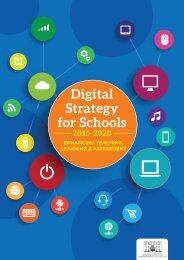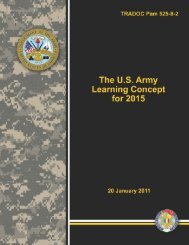Digital Strategy for Schools
TKmc0
TKmc0
Create successful ePaper yourself
Turn your PDF publications into a flip-book with our unique Google optimized e-Paper software.
DIGITAL STRATEGY FOR SCHOOLS – ENHANCING TEACHING, LEARNING & ASSESSMENT<br />
Curriculum:<br />
• All future curricula will include clear statements that focus on the development of digital learning<br />
skills and the use of ICT as a resource in achieving specific outcomes across the curriculum.<br />
• Curriculum specifications will support in-depth study of ICT and specialised application of ICT<br />
tools as appropriate.<br />
Department of Education and Skills and its Agencies:<br />
• Enabling all partners to effectively embed ICT across the continuum of teacher education and in<br />
our schools. The Department will also monitor and evaluate the implementation of the <strong>Strategy</strong><br />
on an annual basis.<br />
Thus, the <strong>Strategy</strong> builds on existing Departmental policy, which strives to equip “all learners with<br />
the knowledge and skills they need to participate fully in society and the economy, one that enables<br />
all learners to learn how to learn” (Public Sector Re<strong>for</strong>m Plan 2014-2016, 2014; p.43) 17 . In this way,<br />
the <strong>Strategy</strong> supports the Department’s Statement of <strong>Strategy</strong> (2015 – 2017) 18 by playing a pivotal<br />
role in the ongoing trans<strong>for</strong>mation of learning in primary and post-primary schools.<br />
THE CONCEPT OF ICT INTEGRATION<br />
To bring this vision to life, the Department is committed to integrating ICT across the system through<br />
a process of ‘ICT integration’.<br />
The concept of ICT integration is regularly used in national strategies and policies, however it is<br />
rarely defined. All too often it is assumed that simply the presence of ICT (i.e. computers, broadband<br />
etc.) in a school will organically lead to ICT integration (Lim and Khine, 2006; OECD, 2015). However,<br />
it is now recognised that the integration of ICT into teaching, learning and assessment is a complex<br />
and challenging process (Qablan, et al., 2009; Brown 2004 in Jamieson-Proctor et al., 2006).<br />
The concept of effective ICT integration goes well beyond the introduction of ICT into schools and<br />
needs to be considered within the wider context of school-improvement with issues such as:<br />
• education change;<br />
• school leadership;<br />
• professional development and support;<br />
• evaluation systems; and<br />
• sharing of professional practice with other teachers and schools (Tondeur, Braak and Valcke,<br />
2008).<br />
In essence, to benefit from the full impact of ICT integration, ICT should be embedded into the school<br />
culture. This often entails redesigning “educational infrastructure, teacher training [approaches],<br />
curriculum structures and materials, classroom practices and modes of assessment” (Livingstone,<br />
2012; p.22) 19 .<br />
14<br />
17<br />
Public Service Re<strong>for</strong>m Plan 2014-2016 (http://www.re<strong>for</strong>mplan.per.gov.ie/2014/downloads/files/Re<strong>for</strong>m%20Plan%202014.pdf)<br />
18<br />
Statement of <strong>Strategy</strong> 2105-2017 (http://education.ie/en/Publications/Corporate-Reports/<strong>Strategy</strong>-Statement/Department-of-Educationand-Skills-Statement-of-<strong>Strategy</strong>-2015-2017.pdf)<br />
19<br />
Critical Reflections on the Benefits of ICT in Education (2012) (http://eprints.lse.ac.uk/42947/1/__libfile_repository_Content_<br />
Livingstone,%20S_Critical%20reflections_Livingstone_Critical%20reflections_2014.pdf)




